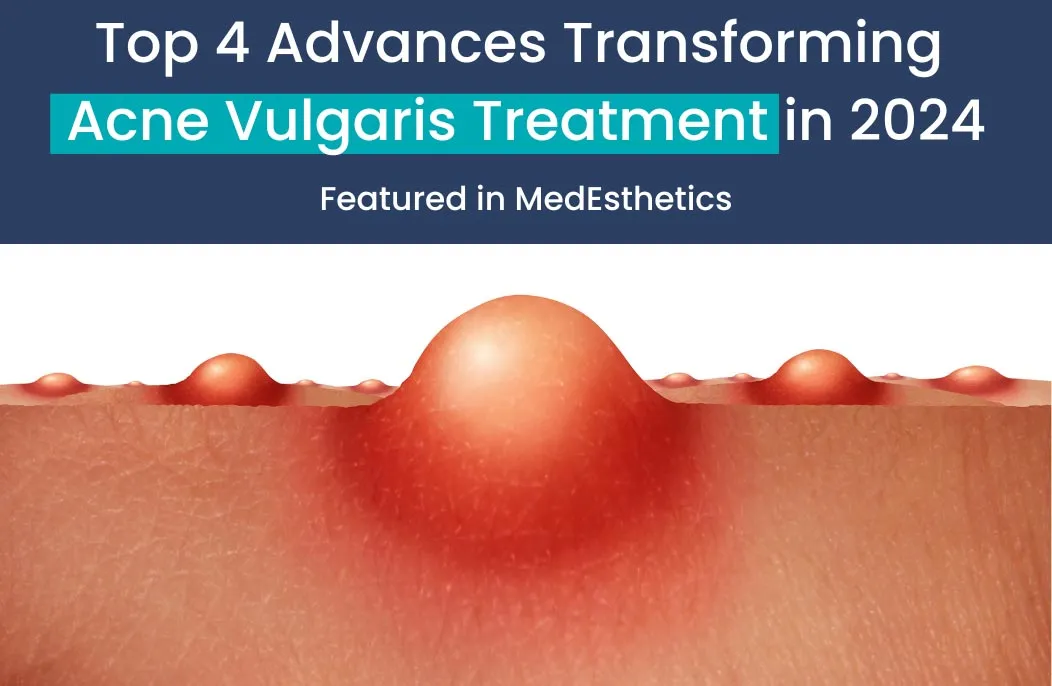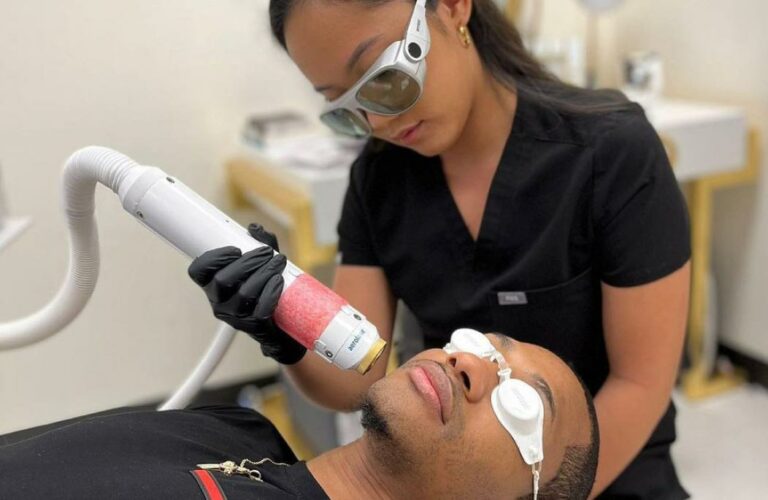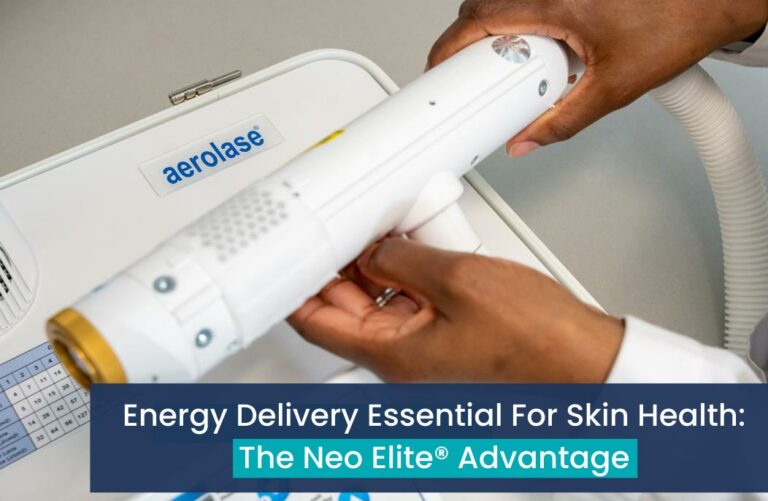We are excited to share an insightful article by Tony Scianna, originally published on MedEsthetics. This article highlights the updated AAD guidelines and recent clinical data highlighting significant advancements in acne treatment, emphasizing the efficacy of energy-based devices like the Aerolase Neo Elite®. New studies underline the importance of targeting inflammation and integrating novel therapeutic approaches to enhance acne management. We are proud to be featured in this piece and believe it offers valuable information for our readers.
Back in February, MedEsthetics reported that The American Academy of Dermatology (AAD) updated its guidelines for the management of acne vulgaris. The updates came after a systematic review published in January 2024 that produced 18 evidence-based recommendations and five good practice statements. Strong recommendations were made for topical benzoyl peroxide, retinoids, oral doxycycline, and antibiotics and their fixed-dose combinations.
Since then, treatment innovations have been actively explored, including new formulations and surgical approaches.
AAD Updates Guidelines
AAD’s updated guidelines are the first change made since 2016. The objective of the January 2024 study was to provide evidence-based recommendations for the management of acne. The researchers conducted a systematic review and applied the Grading of Recommendations, Assessment, Development and Evaluation approach for assessing the certainty of evidence and formulating and grading recommendations.
Along with strong recommendations for antibiotics, topical benzoyl peroxide, retinoids and oral doxycycline, oral isotretinoin is strongly recommended for severe acne, acne-causing psychosocial burden or scarring, or acne failing standard treatment with oral or topical therapy. There were also conditional recommendations made for the use of topical clascoterone, salicylic acid, azelaic acid, oral minocycline, sarecycline, combined oral contraceptives and spironolactone.
Targeting inflammation
A 2023 study in the American Journal of Cosmetic Dermatology looked at potential repurposed treatments based on updated knowledge of pathophysiologic pathways of acne. The study, “Targeting Inflammation in Acne: Current Treatments and Future Prospects” by doctors Sebastian Cruz, Natalia Vecerek and Nada Elbuluk, explored modalities like combinations of existing treatments, repurposing of existing agents historically used for other conditions, new topical treatments, novel antibiotics and others that can link to current and improved understanding of acne pathogenesis.
It found that knowledge of the interplay between numerous pathophysiologic pathways of acne has allowed for the development of novel therapeutic targets and the repurposing of existing topical and systemic treatments. The researchers suggest that future acne treatments will largely focus on reducing inflammation by targeting unregulated cytokine pathways in acne and using novel energy-based devices focusing on the sebaceous glands.
According to the study, there are several new topical treatments for acne currently under investigation, including new classes and formulations, improved penetration of pilosebaceous unit and retinoid lotions using microencapsulation of ingredients and combinations of longstanding treatments, like combined BP and retinoids that are more effective and well tolerated than individual components. The combination of newer topicals and older systemic agents has promise for increased efficacy. Diverse mechanisms of action identified in the study include direct bactericidal activity against C. acnes, inhibition of pro-inflammatory factor release, reduction of oxidative stress, activation of the immune system and modulation of the microbiome.
Acne Vulgaris Treatment Advances Using Energy-Based Devices
ASLMS Abstract: Nonablative Monopolar Radiofrequency
At the 2024 ASLMS Conference, Woraphong Manuskiatti, M.D., discussed the results of a study using nonablative monopolar radiofrequency (NMRF) in the treatment of moderate to severe acne vulgaris.
Twenty-four patients with moderate to severe acne vulgaris underwent a series of two NMRF treatment sessions, spaced 4 weeks apart. To evaluate treatment outcomes, lesion counts and measurements of pore volume, average pore size, sebum production and skin elasticity were quantified using an Antera 3D imaging system, Sebumeter and Cutometer, respectively.
The mean inflammatory lesion counts in the study significantly reduced by 42.86% and 45.71% from the baseline at three and six months after the second treatment. Sebum excretion decreased from baseline by 11.62%, 13.37% and 21.51%, one month after the first treatment and one and six months after the second treatment, respectively. The pore volume decreased by 35% at one month and six months following the final treatment.
Patients’ self-assessments on the degree of improvement and facial oiliness also significantly improved following NMRF treatments. The treatments were well-tolerated without significant adverse effects.
ASLMS Abstract: 595-nm Pulsed Dye Laser for Acne
Also at ASLMS, Arielle NB Kauvar, M.D., presented results from a study on 595-nm pulsed dye laser (PDL) use in acne treatments.
The PDL facial treatments were evaluated at one-month and three-month follow-up visits. The study found statistically significant improvement in IGA scores with an average decrease of 1.8 and 1.6 points in the acne severity scale, at 1- and 3-month follow-ups, respectively, from a baseline score of 3.4.
Inflammatory and non-inflammatory lesion counts were significantly reduced from baseline at the 3-month follow-up and 71% of subjects showed a decrease in PIPA count at the 1-month follow-up and 60% of subjects at the 3-month follow-up visit.
ASLMS Abstract: 1064-nm Pulsed Nd:YAG Laser
Nazanin Saedi, M.D., presented the results of a study looking at the treatment of mild to severe acne vulgaris using a 650- microsecond,1064-nm, pulsed Nd:YAG laser with no skin cooling or anesthetic.
In that study, most subjects noticed improvement on or before the third treatment at 90 days. Clearance reached a median of 90% at the 30-day follow-up. Median IGA values decreased rapidly and 90% of subjects were slightly to highly satisfied and slightly to strongly agreed that their acne treatments improved their self-esteem. Adverse events were not observed.
Future Insights: Acne Vulgaris Market Report
DelveInsight’s Acne Vulgaris Market Insights report projects the market to grow significantly by 2034. Leading acne vulgaris companies such as Dermata Therapeutics, AstraZeneca, Novartis Pharmaceuticals, UCB Pharma, Incyte Corporation and others are developing novel acne vulgaris drugs that can be available in the acne vulgaris market in the coming years.
The report indicates that acne vulgaris market growth is primarily driven by the increasing prevalence of acne cases worldwide, particularly among adolescents and young adults. The growing awareness about skin care and beauty standards fuels the demand for advanced therapeutic solutions, creating opportunities for market expansion. The ongoing introduction of emerging therapies with improved efficacy and a further improvement in the diagnosis rate also drive the growth of the acne vulgaris market.
The report suggests that acne vulgaris market growth may be offset by failures and discontinuation of emerging therapies, unaffordable pricing, market access and reimbursement issues and a shortage of healthcare specialists. Unreported cases and unawareness about the disease may also impact market growth.
The Role of Aerolase Neo Elite in Acne Treatment
Among the various advancements in acne treatment, the Aerolase Neo Elite® stands out for its ability to effectively treat all severities of acne. This 650-microsecond, 1064-nm pulsed Nd laser provides a safe and non-invasive solution by targeting inflammation, reducing sebum production, and improving skin texture without significant adverse effects. Clinical data supports its efficacy in reducing inflammatory lesions and improving patient satisfaction, making it a valuable option for both patients and practitioners seeking advanced acne treatment solutions.
neo elite®
Powerfully Purposeful to Improve Everything Skin Related.
Learn MoreBefore & After Gallery >


